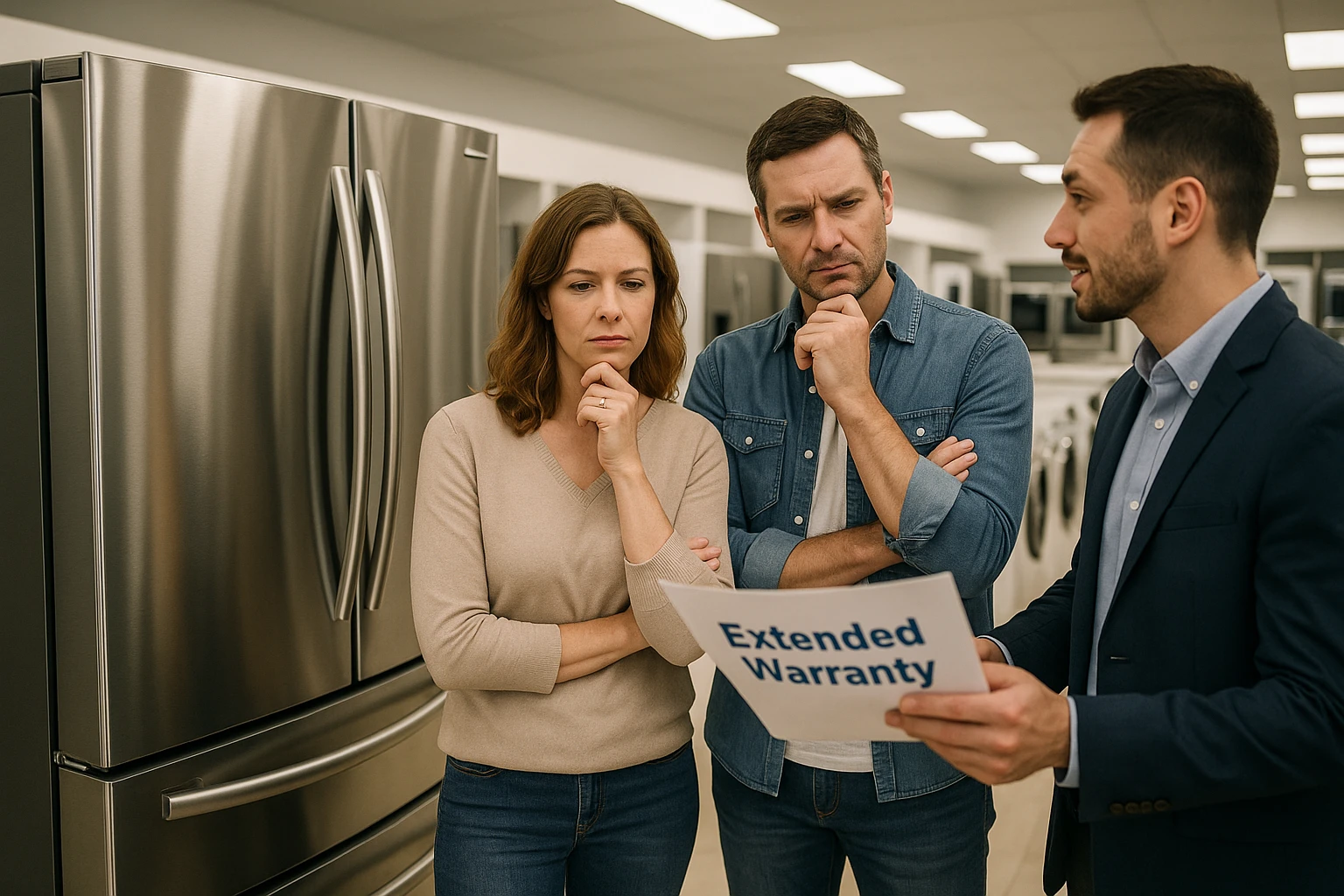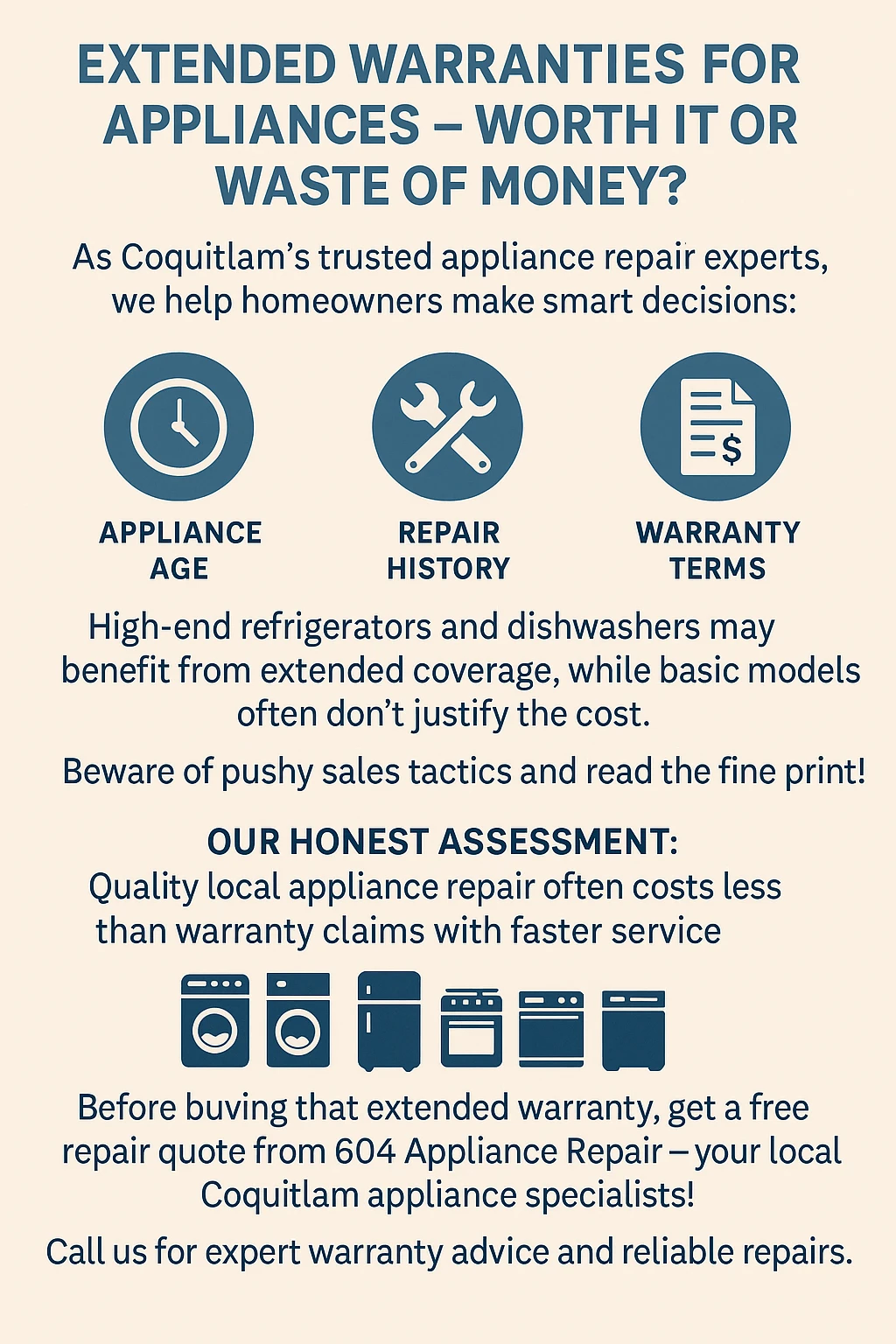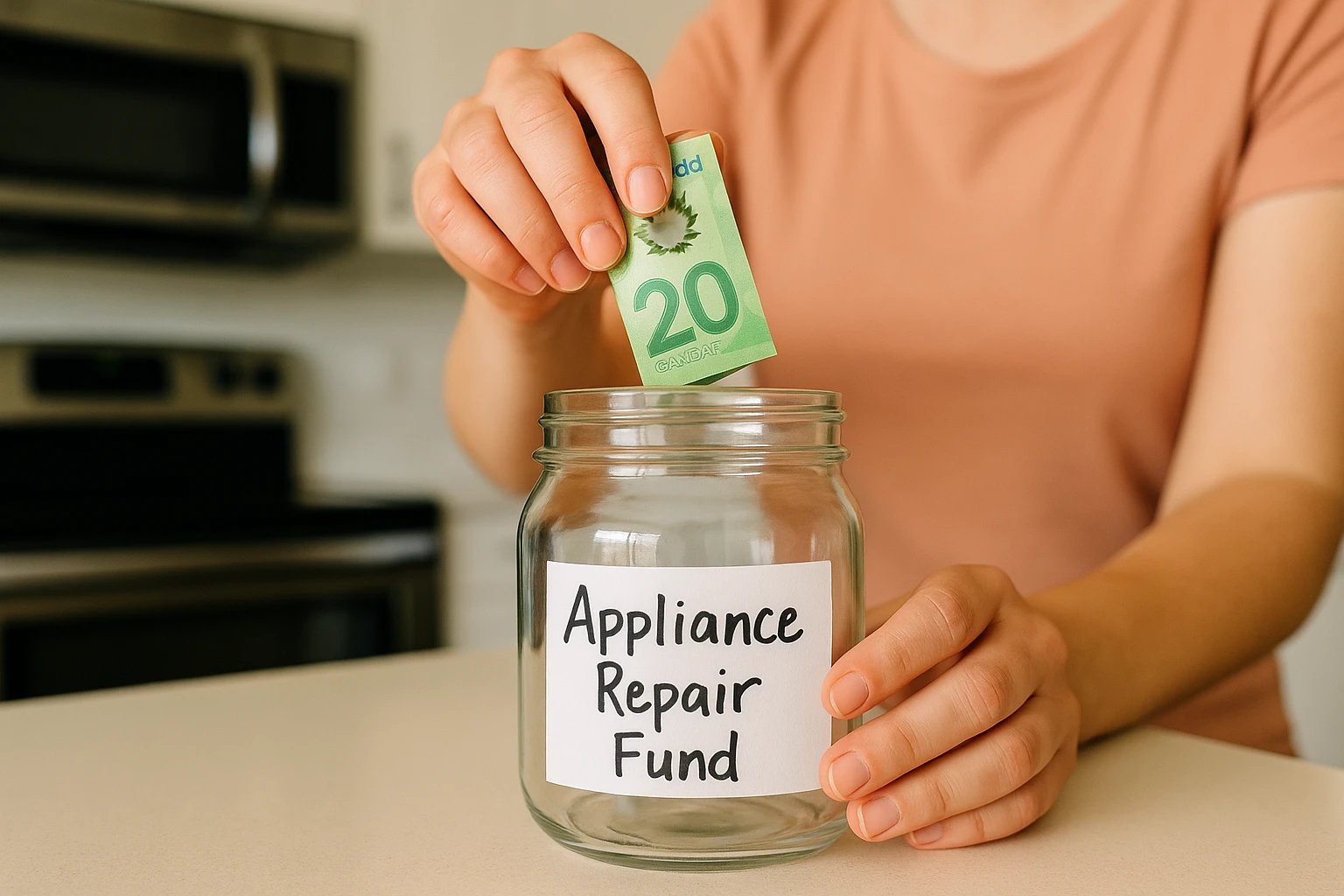Should You Buy Extended Warranties for Your Home Appliances? A Coquitlam Homeowner’s Guide
Wondering if that extended warranty pitch at the appliance store is worth your hard-earned cash? Let’s dive into the real deal about extended warranties for home appliances and whether they’re actually worth it for Coquitlam homeowners like yourself.
Picture this: You’re standing in the appliance store, about to drop some serious cash on a shiny new refrigerator, when the salesperson hits you with that classic line about extended warranties. Your brain starts doing mental gymnastics – do I need this thing, or is it just another way to separate me from my money? It’s like that friend who always tries to convince you to get the expensive insurance on your rental car – you know it’s probably unnecessary, but what if something goes wrong?
As someone who’s been around the block with home appliances (and trust me, I’ve seen enough broken dishwashers to fill a small warehouse), I get why this decision feels overwhelming. Modern appliances aren’t built like they used to be, and the horror stories about repair costs are enough to make anyone’s wallet weep. But here’s the thing – extended warranties aren’t always the villain in this story, and they’re definitely not always the hero either.

The appliance warranty game has changed dramatically over the past few years. With supply chain issues, parts shortages, and appliances that seem to have more computers than my laptop, the landscape is trickier than ever. That’s why I’m here to break down everything you need to know about extended warranties, from the good to the bad to the downright ugly.
Key Outtakes:
- Extended warranties typically cost 10-20% of your appliance’s purchase price but may not cover common issues like accidental damage or normal wear and tear
- Most appliances already come with manufacturer warranties, and many credit cards automatically extend coverage by an additional year at no cost
- High-end appliances with complex features (like smart refrigerators or professional-grade ranges) may benefit more from extended coverage than basic models
- The quality of warranty service varies dramatically – third-party warranties often involve lengthy delays and subpar repair work
- Self-insuring by setting aside warranty money in a dedicated repair fund often proves more cost-effective in the long run

Understanding Extended Warranties for Home Appliances
Let’s start with the basics – what exactly is an extended warranty anyway? Think of it as insurance for your appliances that kicks in after the manufacturer’s warranty expires. Most appliances come with a standard one-year manufacturer warranty, so when you buy a three-year extended warranty, you’re really getting coverage for years two and three. It’s like having a safety net, except you’re paying upfront for a net you might never need to use.
The math behind extended warranties is pretty straightforward on paper. For a $1,200 refrigerator, you might pay between $120 and $240 for extended coverage. That sounds reasonable until you dig into what’s actually covered. Most extended warranties focus on mechanical failures and manufacturer defects – the same stuff your original warranty would handle. They typically don’t cover accidental damage (like when you accidentally slam the freezer door too hard), normal wear and tear, or issues caused by power surges.
Here’s where it gets interesting for us Coquitlam folks. The value of an extended warranty isn’t just about the coverage – it’s about who’s actually going to show up at your door when something breaks. Some warranties are backed by the manufacturer or retailer, while others are sold through third-party insurance companies. The difference in service quality can be like comparing a gourmet meal to a gas station sandwich.
The Real Cost of Appliance Repairs in BC
Before we dive deeper into whether extended warranties make sense, let’s talk about what appliance repairs actually cost here in British Columbia. This is where the rubber meets the road, and honestly, it’s not always pretty. The average service call in the Lower Mainland starts around $150 just to have someone diagnose the problem – and that’s before they even pick up a wrench.
Refrigerator repairs are particularly notorious for being expensive. A simple ice maker replacement can run you $300-500, while a compressor failure might cost more than buying a new fridge altogether. Many homeowners report that their supposedly “repairable” appliances end up being more expensive to fix than replace, especially when you factor in multiple service calls and parts that seem to take forever to arrive.
Washing machines present their own unique challenges. The pumps tend to fail every few years, particularly if you’re dealing with hard water or use your machine frequently. I’ve seen homeowners replace the same pump three times before finally throwing in the towel and buying a new washer. Each repair typically costs $200-400, not including the frustration of water damage from leaks.
The parts availability situation has gotten worse since the pandemic. Supply chains that were already stretched thin completely broke down, leaving appliances sitting broken for months while waiting for a single component. Even with an extended warranty, you’re still at the mercy of global supply chains. No warranty can make parts appear out of thin air, and frankly, warranty companies don’t get priority treatment from parts suppliers.
Professional ranges and high-end appliances are in a league of their own when it comes to repair costs. A 48-inch professional range might cost $600-900 to repair, but these units are also more likely to need service. The complexity of modern appliances means that what used to be simple mechanical problems now involve circuit boards, sensors, and software that can cost hundreds of dollars to replace.
When Extended Warranties Actually Make Sense
Now here’s where I’m going to surprise you – there are actually situations where extended warranties aren’t complete ripoffs. But they’re more specific than most people realize, and they definitely don’t apply to every appliance in your home. The key is understanding which appliances are most likely to break and cost the most to repair.
Refrigerators, particularly counter-depth and built-in models, are prime candidates for extended coverage. These units have service rates of around 13-15% within the first few years, and ice makers are basically guaranteed to cause problems eventually. If you’ve spent $3,000 on a fancy French door refrigerator with all the bells and whistles, a $300 extended warranty might actually save you money. The more complex the appliance, the more likely something will go wrong.
Front-load washing machines are another category where extended warranties can make sense, but not for the reasons you might think. While they’re generally reliable, when they do break, the repairs tend to be expensive. Bearing failures, control board issues, and door seal problems can each cost $400-600 to fix. If you’re running multiple loads daily (looking at you, families with teenagers), the extra wear might justify the coverage.
High-end ranges and cooktops are where extended warranties really shine. Professional-grade appliances have service rates over 15%, and repairs often involve specialized parts and technicians. Some homeowners report multiple service calls within the first few years, making the warranty pay for itself quickly. Plus, these appliances are often essential for serious home cooks who can’t afford to be without their range for weeks.
The sweet spot for extended warranties seems to be appliances that cost more than $1,500 and have complex features like smart connectivity, multiple sensors, or specialized functions. Basic appliances like simple top-load washers, standard dishwashers, and basic ranges rarely justify the warranty cost because they’re either reliable or cheap to repair.
One factor that’s often overlooked is usage patterns. If you’re someone who uses appliances heavily – maybe you’re a caterer working from home, or you have a large family that runs the dishwasher twice daily – the extra wear and tear might make warranty coverage worthwhile. Insurance companies base their pricing on average usage, so heavy users might actually get good value.
The Problems with Most Extended Warranty Programs
Let me paint you a picture of what typically happens when you actually need to use an extended warranty. Your dishwasher starts making that grinding noise that sounds like a garbage disposal full of marbles. You call the warranty company, navigate through their phone system for twenty minutes, and finally reach someone who schedules a service appointment for two weeks from now. The technician shows up, spends five minutes looking at your dishwasher, and declares they need to order parts.
Three weeks later, a different technician arrives with the wrong part. Another two weeks pass before someone shows up with the correct component, only to discover that the original diagnosis was wrong and you actually need a different repair altogether. By this point, you’ve been washing dishes by hand for two months, and you’re seriously considering just buying a new dishwasher and calling it a day.

This scenario plays out thousands of times every year because most extended warranties are administered by third-party companies that subcontract the actual repair work. They’re not appliance experts – they’re insurance companies trying to minimize payouts. The technicians they hire are often the lowest bidders, not necessarily the most skilled or experienced professionals.
The fine print in most extended warranty contracts is where things get really interesting. Many warranties exclude coverage for “cosmetic damage,” which sounds reasonable until you realize that a cracked control panel or damaged door seal might fall under that category. Normal wear and tear is typically excluded, but the definition of “normal” can be surprisingly narrow. Some warranties won’t cover damage caused by power surges, water damage, or even using the appliance in a way the warranty company deems “excessive.”
Service delays are probably the biggest practical problem with extended warranties. While you’re waiting for your covered repair, life goes on. Your frozen food spoils, your family is eating takeout every night, or you’re hauling laundry to the laundromat. The warranty might eventually cover the repair cost, but it won’t compensate you for the inconvenience, lost food, or alternative arrangements you had to make.
Response times are particularly problematic in areas like Coquitlam, where service technicians might be spread thin across a large geographic area. What might be a next-day repair in downtown Vancouver could turn into a week-long wait in the suburbs. The warranty company’s definition of “reasonable response time” might not match your definition of urgent.
Smart Alternatives to Extended Warranties
Here’s what the appliance stores don’t want you to know – there are often better ways to protect yourself than buying their extended warranty. The most obvious alternative is self-insurance. Take that $200 you would have spent on a warranty and put it in a dedicated appliance repair fund. Do this for each major appliance, and you’ll quickly build up a buffer that covers most repair costs while earning interest.

Many credit cards automatically extend manufacturer warranties by an additional year at no cost. This is essentially free extended warranty coverage that most people don’t even realize they have. Check your credit card benefits before buying any extended warranty – you might already be covered. Some premium credit cards offer even better coverage, including protection against accidental damage.
If you’re set on having warranty coverage, consider buying directly from the manufacturer rather than through a third-party provider. Manufacturer warranties are usually honored by authorized service centers who actually know how to work on your specific appliances. The service quality is typically better, and you’re dealing with people who understand your appliance inside and out.
Another strategy is to focus your warranty dollars on the appliances most likely to need service. Rather than buying extended coverage for every appliance, identify the one or two units that are most complex or expensive to repair. A $300 warranty on a $3,000 refrigerator might make sense, while a $100 warranty on a $400 microwave probably doesn’t.
Don’t overlook the value of proper maintenance in preventing repairs. Many appliance failures that seem random are actually caused by neglect – clogged filters, dirty coils, or mineral buildup. A little preventive care can extend your appliance’s life well beyond what any warranty covers. Plus, many warranty claims are denied specifically because of poor maintenance.
Frequently Asked Questions
How do I know if my appliance extended warranty is worth it?
The general rule of thumb is that extended warranties make sense when they cost less than 15% of the appliance’s purchase price and cover items that are expensive to repair. For example, a $200 warranty on a $1,500 refrigerator might be worthwhile, especially if it’s a complex model with ice makers and smart features. However, a $150 warranty on a $600 basic dishwasher probably isn’t worth it.
Consider the appliance’s complexity and your usage patterns. High-end appliances with multiple features are more likely to need service, while basic models tend to be more reliable. If you’re a heavy user or have a large family that puts extra stress on appliances, extended coverage might provide better value.
What’s typically not covered by extended appliance warranties?
Most extended warranties exclude accidental damage, cosmetic issues, normal wear and tear, and problems caused by power surges or environmental factors. They also typically don’t cover pre-existing conditions or damage caused by improper installation or maintenance. Many warranties require you to perform regular maintenance and will void coverage if you can’t prove you’ve kept up with cleaning and filter changes.
Food spoilage from refrigerator failures is sometimes covered, but usually with strict limits and documentation requirements. Labor costs for removal and reinstallation are often excluded, which can add hundreds to your repair bill even with warranty coverage.
Should I buy extended warranties from the store or directly from the manufacturer?
Generally, manufacturer warranties offer better service quality because they’re serviced by authorized technicians who specialize in that brand. Third-party warranties sold by retailers often involve call centers and subcontracted repair services that may not have specific expertise with your appliance. However, manufacturer warranties are typically more expensive than retailer options.
If you’re buying from a retailer that handles their own service (rather than outsourcing to a third party), their warranties can be a good middle ground. The key is ensuring that whoever you buy the warranty from actually has qualified technicians available in your area.
Can I cancel my extended warranty if I change my mind?
Most extended warranties offer a cancellation period, typically 30-60 days from purchase, during which you can get a full refund. After that, you may be eligible for a partial refund based on how much of the warranty period remains unused. However, cancellation policies vary widely between providers, and some may charge administrative fees.
If you’re considering canceling, check whether you’ve already used any coverage or had service calls, as this might affect your refund amount. Some warranties become non-refundable after the first claim, regardless of when you try to cancel.
Wrapping Up
So, should you buy that extended warranty? Like most things in life, it depends. The appliance industry has definitely changed – modern appliances are more complex, parts are harder to get, and repairs are more expensive than ever. But that doesn’t automatically make extended warranties a good deal. In most cases, you’re better off skipping the warranty and either self-insuring or relying on your credit card’s automatic coverage extension.
The exceptions are high-end appliances with complex features, particularly refrigerators and professional ranges. If you’re spending serious money on appliances that are expensive to repair and likely to need service, a quality extended warranty from a reputable provider might be worth considering. Just make sure you understand exactly what’s covered and who’s going to show up at your door when something breaks.
Remember that the goal isn’t just to get your appliance fixed – it’s to get it fixed quickly and correctly by someone who knows what they’re doing. The cheapest warranty isn’t always the best value if it means waiting weeks for subpar service. Your time and peace of mind have value too, and that’s something worth factoring into your decision. Whether you’re in Coquitlam, Vancouver, or anywhere else in BC, the key is making an informed choice based on your specific situation, not just the sales pitch you hear at the store.
